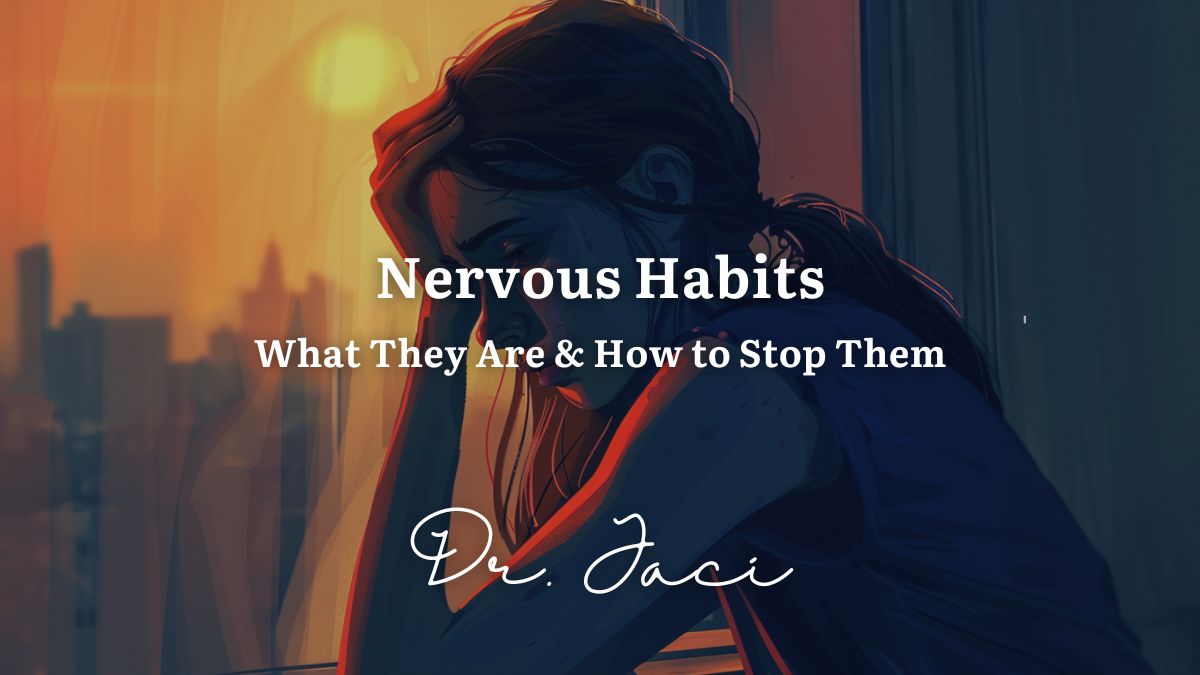As a clinical psychologist, I’ve seen countless clients struggling with nervous habits that can significantly impact their daily lives and overall well-being.
In this blog post, we’ll explore nervous habits, their causes, and effective strategies for managing them.
What Are Nervous Habits?

Nervous habits are repetitive behaviors that people engage in when they feel anxious, stressed, or uncomfortable.
These habits can manifest in various forms, such as:
- Nail-biting
- Hair-twirling or pulling
- Skin-picking
- Lip-biting
- Foot-tapping
- Pen-clicking
These habits often start as small, seemingly harmless behaviors but can escalate over time, becoming more frequent and intense.
For example, occasional nail biting might evolve into a constant habit that leaves the fingers raw and painful.
Nervous habits are incredibly common. Many people can identify with the experience of sitting in a stressful meeting or waiting for important news and finding themselves automatically reaching for a nervous habit.
For instance, you might notice yourself bouncing your leg or biting your lip during a tense conversation with your boss, or you might find yourself twirling your hair while studying for a challenging exam.
While these habits can temporarily relieve or distract from anxiety, they can also have negative consequences.
Nail biting, for example, can lead to painful, damaged nails and an increased risk of infection. Hair pulling can result in noticeable hair loss and feelings of shame or embarrassment.
It’s important to remember that nervous habits are not a sign of weakness or lack of self-control.
They are a common response to stress and anxiety, and with the right tools and techniques, they can be managed effectively.
By understanding the psychology behind these habits and developing healthy coping strategies, you can break the cycle of nervous habits and improve your overall well-being.
Psychology Behind Nervous Habits

Nervous habits are often rooted in psychological factors such as stress, anxiety, and emotional discomfort. When we experience these negative emotions, our body and mind instinctively seek ways to cope and find relief.
Engaging in repetitive, self-soothing behaviors like nail-biting or hair-twirling can provide a temporary sense of comfort and distraction from the underlying emotional distress.
From a psychological perspective, the development and maintenance of nervous habits can be explained through several key concepts.
Operant Conditioning
Operant conditioning, a theory developed by B.F. Skinner, proposes that behaviors are shaped by their consequences.
When a behavior results in a desirable outcome (such as reducing stress or providing a sense of comfort), it is positively reinforced, increasing the likelihood that the behavior will be repeated in similar situations.
In the case of nervous habits, the temporary relief from stress and anxiety acts as a positive reinforcer, strengthening the habit over time.
For example, if biting your nails helps you feel slightly calmer during a stressful meeting, your brain learns to associate nail-biting with stress relief, making you more likely to engage in the behavior when faced with similar stressors in the future.
Negative Reinforcement
Negative reinforcement occurs when the removal of an unpleasant stimulus strengthens a behavior. In the context of nervous habits, engaging in the habit may help alleviate the discomfort of stress or anxiety, thereby negatively reinforcing the behavior.
For instance, if pulling your hair helps distract you from runaway thoughts, the reduction in anxiety (removal of an unpleasant stimulus) increases the likelihood that you’ll resort to hair-pulling the next time you experience anxiety.
Classical Conditioning
Classical conditioning, pioneered by Ivan Pavlov, involves learning to associate a neutral stimulus with a particular response. In the case of nervous habits, certain situations or emotions (such as stress or boredom) can become associated with the habit, serving as triggers for the behavior.
If you frequently bite your lip while working on challenging projects, your brain may begin to associate work-related stress with lip-biting. As a result, you may find yourself automatically reaching for the habit whenever you encounter work stressors, even if you’re not consciously aware of the connection.
Emotional Regulation
Nervous habits can also be understood as a form of emotional regulation, or an attempt to manage and cope with difficult emotions. When faced with stress, anxiety, or other uncomfortable feelings, engaging in a repetitive, self-soothing behavior can provide a sense of control and help regulate the emotional experience.
Some nervous habits may be a self-soothing mechanism when you’re feeling overwhelmed or anxious, helping you regulate your emotions and feel more grounded in the present moment.
Habit Formation
Over time, repetition of a nervous habit can lead to the formation of a deeply ingrained behavioral pattern.
As the habit becomes more automatic and habitual, it may be triggered by a wider range of stimuli and become more difficult to control or stop.
This is why many people find that their nervous habits persist even when they’re not feeling particularly stressed or anxious – the behavior has become a learned response that occurs automatically in certain situations.
By understanding the psychological factors that contribute to the development and maintenance of nervous habits, you can develop greater insight into your own patterns of behavior and take steps to manage and overcome these habits.
With a combination of self-awareness, stress management techniques, and targeted interventions like habit reversal training or cognitive-behavioral therapy, it is possible to break the cycle of nervous habits and develop healthier, more adaptive coping strategies.
Managing Nervous Habits

Managing nervous habits requires a combination of self-awareness, stress reduction, and the development of alternative coping strategies. Some effective techniques include:
Mindfulness
Mindfulness is a powerful tool for managing nervous habits. By practicing mindfulness, you can become more aware of your thoughts, feelings, and behaviors in the present moment, without judgment.
This heightened awareness can help you recognize when you’re engaging in a nervous habit and make a conscious choice to stop.
For example, if you’re a nail-biter, you might notice that you tend to bite your nails when you’re feeling stressed or anxious. By practicing mindfulness, you can learn to observe these feelings without automatically reacting to them.
Instead of immediately starting to bite your nails, you can take a moment to acknowledge your feelings and choose a different response.
To practice mindfulness, try setting aside a few minutes each day to focus on your breath and observe your thoughts and sensations without getting caught up in them.
You can also try mindfulness exercises like body scans or mindful eating to develop greater awareness and control over your behaviors.
Stress Management
Since nervous habits are often a response to stress and anxiety, managing stress is a key component of breaking these habits.
Engaging in regular stress-reducing activities can help you feel calmer and more in control, reducing the urge to engage in nervous habits.
Some effective stress management techniques include:
- Exercise: Regular physical activity can help reduce stress and anxiety by releasing endorphins and promoting relaxation.
- Meditation: Practicing meditation can help calm the mind and reduce stress and anxiety.
- Deep breathing: Taking slow, deep breaths can help activate the body’s relaxation response and reduce feelings of stress and tension.
- Yoga: Combining physical movement, breathing exercises, and meditation, yoga can be a powerful tool for stress relief.
Incorporating these activities into your daily routine can help you build resilience to stress and reduce the frequency and intensity of your nervous habits.
Habit Reversal Training
Habit reversal training is a specific technique for managing nervous habits. It involves three main steps:
- Awareness training: Becoming more aware of when and how you engage in your nervous habit.
- Competing response training: Developing a new behavior to replace the nervous habit.
- Motivation and generalization: Practicing the new behavior consistently and in a variety of situations.
If you’re a hair twirler, you might use habit reversal training in the following way:
- Notice when you start twirling your hair and what triggers the behavior (e.g., feeling bored or anxious).
- Choose a competing response, like gently clasping your hands together or squeezing a stress ball.
- Practice the competing response consistently, both in situations where you typically twirl your hair and in other situations where you feel the urge to do so.
By consistently practicing the new behavior, you can break the cycle of the nervous habit and develop healthier coping strategies.
Cognitive-Behavioral Therapy (CBT)
CBT is a type of psychotherapy that can be highly effective for managing nervous habits.
In CBT, you work with a therapist to identify the thoughts and beliefs that contribute to your nervous habits and develop strategies for challenging and changing these thought patterns.
For example, if you bite your lips when you’re feeling self-conscious or insecure, your therapist might help you identify the negative self-talk that triggers this behavior (e.g., “I’m not good enough” or “Everyone is judging me”).
Then, you’ll work together to develop more realistic and positive ways of thinking (e.g., “I’m doing my best” or “Most people are focused on themselves, not on judging me”).
By changing the underlying thought patterns that fuel your nervous habits, you can reduce the urge to engage in these behaviors and develop greater self-confidence and resilience.
Self-Compassion for Nervous Habits
As you embark on the journey of managing your nervous habits, it’s essential to approach the process with self-compassion.
Self-compassion involves treating yourself with the same kindness, understanding, and support you would offer a good friend going through a difficult time.
Breaking a nervous habit is rarely a linear process.
There will be ups and downs, successes and setbacks. It’s crucial to remember that this is a normal part of the journey and not a reflection of your worth or abilities.
When you slip up and find yourself engaging in your nervous habit, resist the urge to criticize or blame yourself. Instead, practice self-compassion by acknowledging that change is hard and that setbacks are a natural part of the process.
Imagine a close friend confiding in you about their struggle to break a nervous habit. You wouldn’t berate them for their missteps or tell them they’re not trying hard enough. Instead, you’d likely offer them understanding, encouragement, and support. Extend that same compassion to yourself. Recognize that you’re doing your best, and celebrate your progress, no matter how small it may seem.
Practicing self-compassion can have significant benefits for your mental health and well-being. Research has shown that self-compassion is associated with reduced stress, anxiety, and depression, as well as increased motivation, resilience, and overall life satisfaction. By treating yourself with kindness and understanding, you create a supportive inner environment that can help you weather the challenges of breaking a nervous habit.
One powerful way to cultivate self-compassion is through talk therapy.
Working with a therapist can provide a safe, non-judgmental space to explore your thoughts, feelings, and behaviors related to your nervous habits.
In therapy, you can learn to identify and challenge the negative self-talk that often accompanies nervous habits. For example, if you catch yourself thinking, “I’m so weak for biting my nails again,” a therapist can help you reframe that thought in a more self-compassionate way, such as, “I’m doing my best to change a deeply ingrained habit, and that takes time and effort.”
Additionally, a therapist can help you develop a personalized plan for managing your nervous habits tailored to your unique needs and circumstances.
By modeling self-compassion and providing a supportive, non-judgmental presence, a therapist can help you internalize these attitudes and develop a more loving, accepting relationship with yourself.
Seeking Professional Help
If your nervous habits are causing significant distress or interfering with your daily life, don’t hesitate to seek professional help.
A qualified mental health professional, such as a clinical psychologist or therapist, can provide personalized guidance and support in managing your habits and addressing the underlying causes of your anxiety.

